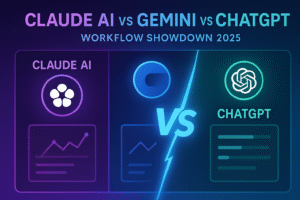AI News Today: How AI Agents Are Transforming Marketing
Introduction
In 2025, AI agents are no longer just experimental assistants. They are fully operational marketing team members—planning, creating, optimizing, and scaling campaigns autonomously. As businesses race to keep up with digital acceleration, AI agents have become essential tools for marketers seeking to drive results faster, cheaper, and smarter.
What is AI News Today: How AI Agents Are Transforming Marketing?
AI agents in marketing are autonomous or semi-autonomous systems that perform tasks such as:
Writing blog posts and ads
Analyzing SEO and trends
Automating social media scheduling
Crafting personalized email sequences
Managing paid ad campaigns
Generating reports and insights
They operate with logic flows, prompt instructions, tools (APIs), and sometimes memory, making them far more adaptive than traditional automation.
Key Components of AI Marketing Agents
1. LLMs (Language Models)
GPT-4o, Claude, or Mistral power content creation, summarization, rewriting, and idea generation.
2. Workflow Orchestration
Using platforms like LangGraph, CrewAI, or Zapier + OpenAI to trigger multi-step workflows.
3. Toolkits & APIs
Connectors for Mailchimp, HubSpot, Google Analytics, Notion, WordPress, etc.
4. Persona & Brand Voice Memory
Agents trained with company-specific tone, style, and buyer personas.
5. Autonomous Feedback Loops
Self-correcting loops that A/B test, analyze, and iterate campaigns.
Real-world Applications
✅ Content Creation
Agents generate full blog posts, SEO meta tags, images (via DALL·E), and even publish on WordPress.
✅ Email Campaigns
Personalized, dynamic drip sequences using behavior-based triggers.
✅ Ad Optimization
Generate multiple copy variants, analyze CTR, and adjust bids or targeting in real-time.
✅ Social Media Management
Auto-schedule, post, respond to comments, and summarize performance.
Case Study: AI Agent for Customer Service → Marketing Shift
A mid-size eCommerce brand first deployed an AI agent to manage customer service chats. After success, they extended its logic to marketing.
Agent Tasks Included:
Weekly product newsletter generation
Auto-generation of discount campaigns
Cross-platform ad testing with creative variations
Real-time UTM analytics reporting
Results:
+42% open rate improvement
10x content output with no increase in human labor
25% ad spend efficiency improvement
Challenges and Considerations
Brand Consistency: Agents must be trained on voice and compliance.
Data Privacy: Email and CRM tools need tight integration with AI under GDPR/CCPA compliance.
Over-Automation Risk: Human touch is still vital for strategic pivots.
Prompt Drift: Agents may “drift” from brand tone over time without feedback loops.
Future Outlook
Expect AI marketing agents to become:
Real-time campaign managers, optimizing while campaigns run
Voice/video ad creators, thanks to multimodal AI
Buyer journey-aware, adjusting content across stages automatically
Integrated with AI CRMs, linking actions to ROI transparently
By 2026, the line between “marketer” and “agent operator” will blur, with marketers designing systems more than writing copy.
Conclusion
AI agents are no longer side tools—they’re the central nervous system of digital marketing. Mastering their workflows gives brands exponential reach, precision targeting, and the ability to adapt at machine speed.
🚀 Want to Master AI Tools?
Join our recommended AI Mastery Course and start building your own marketing agents today!

